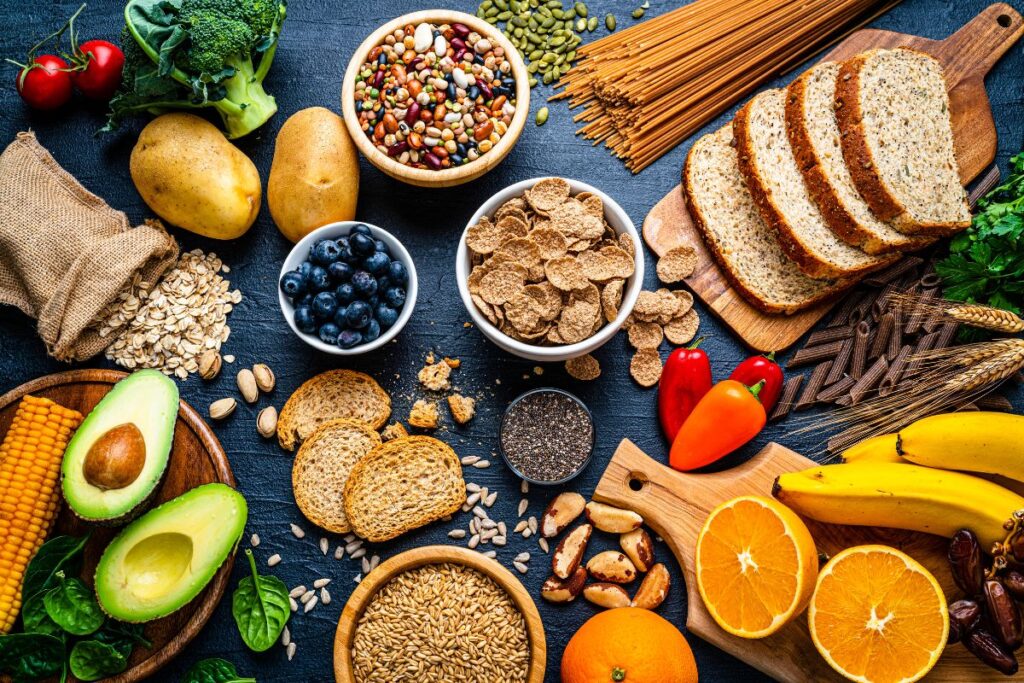Dietary fiber in your daily nutrition refers to the indigestible parts of plant-based foods that pass through the digestive system, absorbing water and easing bowel movements. There are two types of dietary fiber: soluble and insoluble. Soluble fiber dissolves in water to form a gel-like substance, helping to lower blood cholesterol and glucose levels. Insoluble fiber adds bulk to stool and aids in the movement of material through the digestive system.
Health Benefits of Dietary Fiber
Including dietary fiber in your daily nutrition offers numerous health benefits:
- Digestive Health: Fiber helps to prevent constipation by adding bulk to stool and promoting regular bowel movements. It also reduces the risk of developing hemorrhoids and diverticulitis.
- Heart Health: Soluble fiber can help lower cholesterol levels, reducing the risk of heart disease. It also helps to control blood pressure and inflammation.
- Blood Sugar Control: Fiber, especially soluble fiber, can slow the absorption of sugar, helping to improve blood sugar levels and manage diabetes.
- Weight Management: High-fiber foods are more filling than low-fiber foods, helping you to eat less and stay satisfied longer. This can contribute to weight loss and weight maintenance.
- Reduced Cancer Risk: A high-fiber diet has been linked to a lower risk of developing colorectal cancer and other digestive tract cancers.
Best Sources of Dietary Fiber
Incorporating dietary fiber in your daily nutrition can be achieved by eating a variety of fiber-rich foods:
- Fruits: Apples, bananas, oranges, berries, pears, and avocados are excellent sources of fiber.
- Vegetables: Broccoli, carrots, Brussels sprouts, and leafy greens like spinach and kale are fiber-rich.
- Whole Grains: Foods like oats, barley, brown rice, quinoa, and whole wheat products are high in fiber.
- Legumes: Beans, lentils, chickpeas, and peas are some of the best sources of fiber.
- Nuts and Seeds: Almonds, chia seeds, flaxseeds, and sunflower seeds add fiber to your diet.
Tips for Increasing Dietary Fiber in Your Diet
To ensure you are getting enough dietary fiber in your daily nutrition, consider the following tips:
- Start Your Day with Fiber: Choose high-fiber cereals or oatmeal for breakfast.
- Eat Whole Fruits and Vegetables: Instead of juices, opt for whole fruits and vegetables to get the full fiber content.
- Snack Smart: Choose nuts, seeds, or raw vegetables over processed snacks.
- Include Legumes: Add beans or lentils to soups, salads, and casseroles.
- Go Whole Grain: Replace refined grains with whole grains in your meals.
Common Myths About Dietary Fiber
There are several myths about dietary fiber in your daily nutrition that need to be debunked:
- Myth: All fibers are the same: Fact: There are different types of fiber, each with unique health benefits. Both soluble and insoluble fibers are important for overall health.
- Myth: Fiber supplements are as good as fiber-rich foods: Fact: While supplements can help, they lack the additional nutrients and benefits found in whole foods.
- Myth: Fiber causes bloating and gas: Fact: Increasing fiber intake gradually and drinking plenty of water can help minimize these effects.
Incorporating dietary fiber in your daily nutrition is not only beneficial for digestive health but also for overall well-being. For more detailed information on the importance of dietary fiber and how to incorporate it into your diet, visit this article on Mayo Clinic.
By understanding the significance of dietary fiber and making conscious efforts to include it in your diet, you can enjoy better health and a higher quality of life. Start today by adding more fiber-rich foods to your meals and reaping the numerous health benefits they offer.

